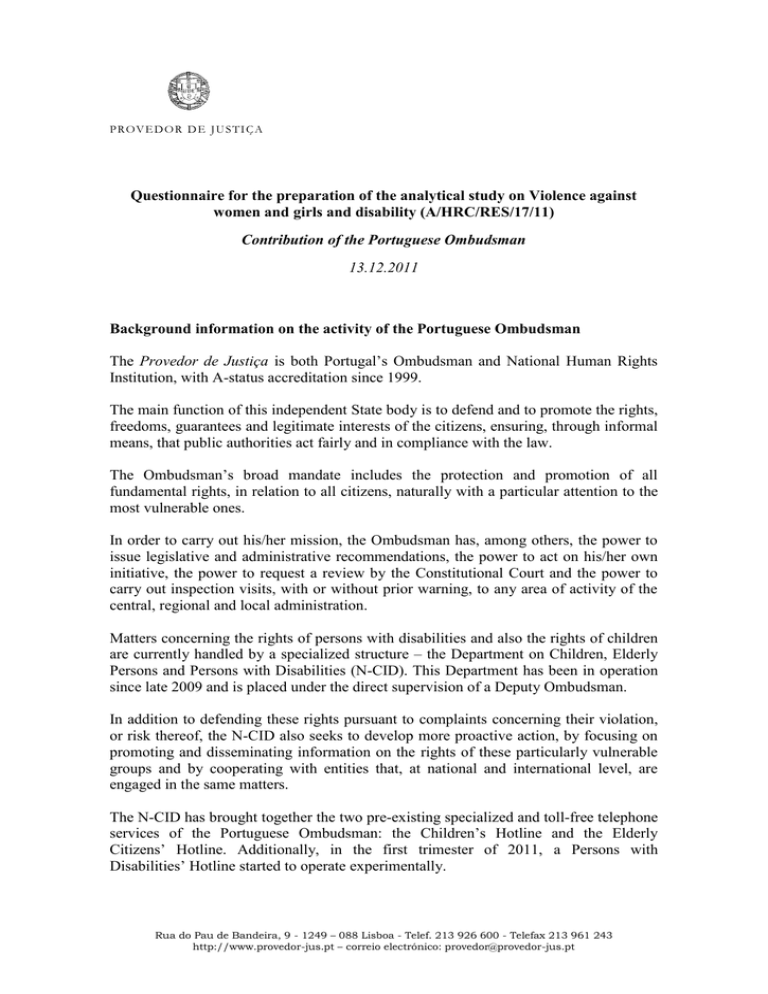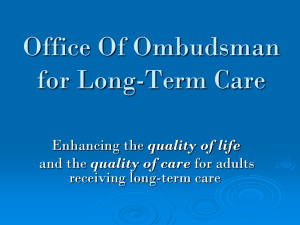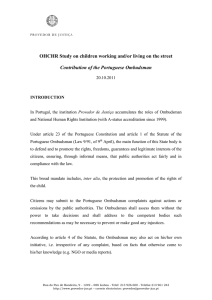Questionnaire for the preparation of the analytical study on Violence... women and girls and disability (A/HRC/RES/17/11)
advertisement

PROVEDOR DE JUSTIÇA Questionnaire for the preparation of the analytical study on Violence against women and girls and disability (A/HRC/RES/17/11) Contribution of the Portuguese Ombudsman 13.12.2011 Background information on the activity of the Portuguese Ombudsman The Provedor de Justiça is both Portugal’s Ombudsman and National Human Rights Institution, with A-status accreditation since 1999. The main function of this independent State body is to defend and to promote the rights, freedoms, guarantees and legitimate interests of the citizens, ensuring, through informal means, that public authorities act fairly and in compliance with the law. The Ombudsman’s broad mandate includes the protection and promotion of all fundamental rights, in relation to all citizens, naturally with a particular attention to the most vulnerable ones. In order to carry out his/her mission, the Ombudsman has, among others, the power to issue legislative and administrative recommendations, the power to act on his/her own initiative, the power to request a review by the Constitutional Court and the power to carry out inspection visits, with or without prior warning, to any area of activity of the central, regional and local administration. Matters concerning the rights of persons with disabilities and also the rights of children are currently handled by a specialized structure – the Department on Children, Elderly Persons and Persons with Disabilities (N-CID). This Department has been in operation since late 2009 and is placed under the direct supervision of a Deputy Ombudsman. In addition to defending these rights pursuant to complaints concerning their violation, or risk thereof, the N-CID also seeks to develop more proactive action, by focusing on promoting and disseminating information on the rights of these particularly vulnerable groups and by cooperating with entities that, at national and international level, are engaged in the same matters. The N-CID has brought together the two pre-existing specialized and toll-free telephone services of the Portuguese Ombudsman: the Children’s Hotline and the Elderly Citizens’ Hotline. Additionally, in the first trimester of 2011, a Persons with Disabilities’ Hotline started to operate experimentally. Rua do Pau de Bandeira, 9 - 1249 – 088 Lisboa - Telef. 213 926 600 - Telefax 213 961 243 http://www.provedor-jus.pt – correio electrónico: provedor@provedor-jus.pt PROVEDOR DE JUSTIÇA These Hotlines provide specialised and personalised treatment, in the most informal and expeditious way possible. When a complaint received through one of the Hotlines is too complex to be dealt with in the very informal and expeditious way in which they operate, a formal case is opened at the office of the Ombudsman. Formal cases are also opened to deal with complaints received through other contact means, as well as in cases of own-initiative interventions. Data/Statistics on the activity of the Portuguese Ombudsman concerning violence against women and girls with disabilities The Ombudsman has no significant register of complaints concerning violence against women and girls with disabilities, neither has he become aware of situations that would justify an own-initiative intervention. Also, no studies or research have thus far been conducted by the Ombudsman with a specific focus on this issue. In any case, it should be noted that the scope of intervention of the Portuguese Ombudsman when dealing with cases of violence is generally delimited by the following aspects: The Ombudsman intervenes primarily pursuant to complaints and only more residually on his/her own initiative; As a rule, the Ombudsman cannot intervene directly with regard to the conduct of private entities; The Ombudsman is also not competent to investigate matters from a criminal law perspective (i.e. investigation/prosecution of criminal offences); The Ombudsman cannot intervene in a case to assess an issue which is pending in court, neither can he/she assess, review or modify the content of judicial decisions. In light of this, if dealing with a complaint concerning violence against a woman or girl with disability, the action of the Portuguese Ombudsman is fundamentally focused on ensuring that the competent public authorities are aware of the case and that they exercise their competences in a timely and adequate manner, so as to prevent, halt or remedy the situation and to provide support and compensation to the victim. The Ombudsman will also strive to inform the complainants of existing remedies that they can resort to, e.g. the possibility to report the case to the police of Public Prosecutor. Additionally, if sufficient indication of criminal, disciplinary or regulatory offences arises in the course of the proceeding, the Ombudsman directly informs, as the case may be, the Public Prosecutor or the authority that is hierarchically competent to initiate disciplinary or regulatory proceedings. As regards the collection of statistical data: at the Office of the Portuguese Ombudsman data on violence against persons with disabilities is collected but without disaggregation based on sex, age, socio-economic and ethnic backgrounds. Likewise, data on sex, age Rua do Pau de Bandeira, 9 - 1249 – 088 Lisboa - Telef. 213 926 600 - Telefax 213 961 243 http://www.provedor-jus.pt – correio electrónico: provedor@provedor-jus.pt PROVEDOR DE JUSTIÇA and socio-economic background of complainants is collected through a voluntary questionnaire but in a general matter, i.e. not reported to the subject matter of the complaints presented. Data on ethnic background is not collected: this information is only known if the complainant spontaneously provides it, which is usually only the case when it is relevant to the complaint – e.g. complaints against discrimination. Other information We seek to provide herewith a few general notes on some aspects of the Portuguese system as regards violence against women and girls with disabilities, which we believe may be helpful. However, for more detailed information, we would suggest contacting the competent governmental bodies. Question 5 In Portugal there are several special laws in force dealing with disability in areas such as employment, taxation, social support, etc. However, no specific legislation exists cumulating the matters of disability, violence and the rights of women and girls. There is legislation on the issues of domestic violence and violence against women: Law 61/91, of 13th August, on the protection of women victims of violence; Law 104/2009, of 14th September, of 16th September, concerning the granting of compensation to victims of violent crimes and domestic violence; and Law 112/2009, establishing the legal framework for the prevention of domestic violence, protection and assistance to its victims. However, these legal instruments are not limited to, nor specifically focused on, the topic of disability. The Portuguese Criminal Code does contain a provision on the crime of abuse that specifically mentions the situation of people with disability, but it is drafted in a genderneutral perspective: Article 152-A 1 – Whomever, having under his/her care, guardianship, responsibility of direction or education or working at his/her service, a minor or particularly vulnerable person in view of age, disability, illness or pregnancy, and: a) Inflicts upon him/her, repeatedly or not, physical or psychological abuse, including corporal punishments, deprivation of liberty or sexual offences, or treats him/her cruelly; b) Employs him/her in dangerous, inhumane or forbidden activities; c) Overburdens him/her with excessive work; Rua do Pau de Bandeira, 9 - 1249 – 088 Lisboa - Telef. 213 926 600 - Telefax 213 961 243 http://www.provedor-jus.pt – correio electrónico: provedor@provedor-jus.pt PROVEDOR DE JUSTIÇA shall be punished with prison from 1 to 5 years, if a more serious penalty is not applicable under another legal provision. 2 – If the fact envisaged in paragraph 1 results in: a) Serious offence to physical integrity, the agent shall be punished with prison from 2 to 8 years; b) Death, the agent shall be punished with prison from 3 to 10 years. The Criminal Code also contains a provision on the crime of domestic violence, which specifically mentions the issue of disability, but again in a gender-neutral perspective: Article 152 1. Whoever, in a repetitive manner or otherwise, inflicts physical or mental maltreatment, including bodily punishments, deprivation of liberty and sexual abuses: a) On the spouse or ex-spouse; b) On a person of the same or another gender with whom the offender maintains or has maintained a civil partnership, even if without cohabitation; c) On a parent of a common descendant in first degree; or d) On a particularly helpless person by reason of age, disability, disease, pregnancy or economic dependency, who cohabitates with the offender; is punished with imprisonment from one to five years, if a more severe sentence does not applicable to him by virtue of another legal provision. 2. In the case provided for in the preceding paragraph, the offender is punished with imprisonment from two to five years if he commits the act against a minor, in the presence of a minor, in the common domicile or in the victim’s domicile. 3. If the acts provided for in paragraph 1 cause: a) Grievous bodily injury, the offender is punished with imprisonment from two to eight years; Rua do Pau de Bandeira, 9 - 1249 – 088 Lisboa - Telef. 213 926 600 - Telefax 213 961 243 http://www.provedor-jus.pt – correio electrónico: provedor@provedor-jus.pt PROVEDOR DE JUSTIÇA b) Death, the offender is punished with imprisonment from three to ten years. 4. In the cases provided for in the preceding paragraphs, the accessory sentences of prohibition of contact with the victim and of prohibition of use and carrying weapons may be imposed on the defendant for a period from six months to five years, as well as the accessory sentence of obligation to attend specific programs for prevention of domestic violence. 5. The accessory sentence of prohibition of contact with the victim may include the restriction from approaching the victim’s residence or place of work and its compliance may be supervised by remote technical means. 6. Whoever is convicted for a criminal offence provided for in this article may, considering the concrete seriousness of the act and its connection with the function performed by the offender, be hindered from the parental authority, tutorship or curatorship for a period from one to ten years. Question 6 Yes, these practices are prohibited by law. Question 7: As mentioned above, there is specific legislation in Portugal regarding violence and its victims, including legislation with a specific focus on violence against women and domestic violence. However, in general these laws are not limited to, nor specifically focused on, persons with disabilities. And the provisions that do contain some focus in the area of disability are drafted in a gender neutral perspective. As regards policies and programs, account should be taken of the 4th National Plan Against Domestic Violence (2011-2013), adopted by Council of Ministers’ Resolution 100/2010, of 17th December, which is an instrument for public policies to combat to domestic and gender violence. This instrument has a broad scope, but states that special attention should be paid to situations of particularly vulnerable victims of domestic violence, including young people and people with disabilities. Question 17: Most public services visited by the Ombudsman have accessibility difficulties, as they are installed in old buildings. The relevant legislation in this regard (Decree-law 163/2006, of 8th August) establishes accessibility requirements mainly for new buildings. As for old buildings, it determines that in principle construction works should be carried out to ensure accessibility, but they are exempted from this obligation if it entails disproportionate difficulties, costs or Rua do Pau de Bandeira, 9 - 1249 – 088 Lisboa - Telef. 213 926 600 - Telefax 213 961 243 http://www.provedor-jus.pt – correio electrónico: provedor@provedor-jus.pt PROVEDOR DE JUSTIÇA if they noticeably affect cultural and historic patrimony whose morphologic, architectonic or environmental characteristics one wishes to preserve. Question 18 There are shelters (Casas Abrigo) for women victims of violence. Most shelters visited by the Ombudsman are accessible to women with disabilities because were installed in new buildings. Question 21 There is only the general system, which also covers women and girls with disabilities. Legal protection may be granted to Portuguese citizens, European Union citizens and foreigners and stateless persons with habitual residence in Portugal, who demonstrate that they do not have sufficient financial means to pay the fees of the legal representatives and to pay, in full or in part, the normal costs of legal proceedings. Rua do Pau de Bandeira, 9 - 1249 – 088 Lisboa - Telef. 213 926 600 - Telefax 213 961 243 http://www.provedor-jus.pt – correio electrónico: provedor@provedor-jus.pt



